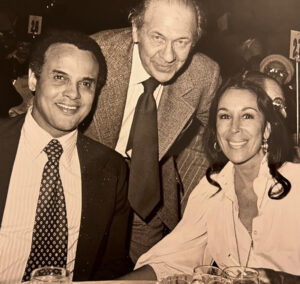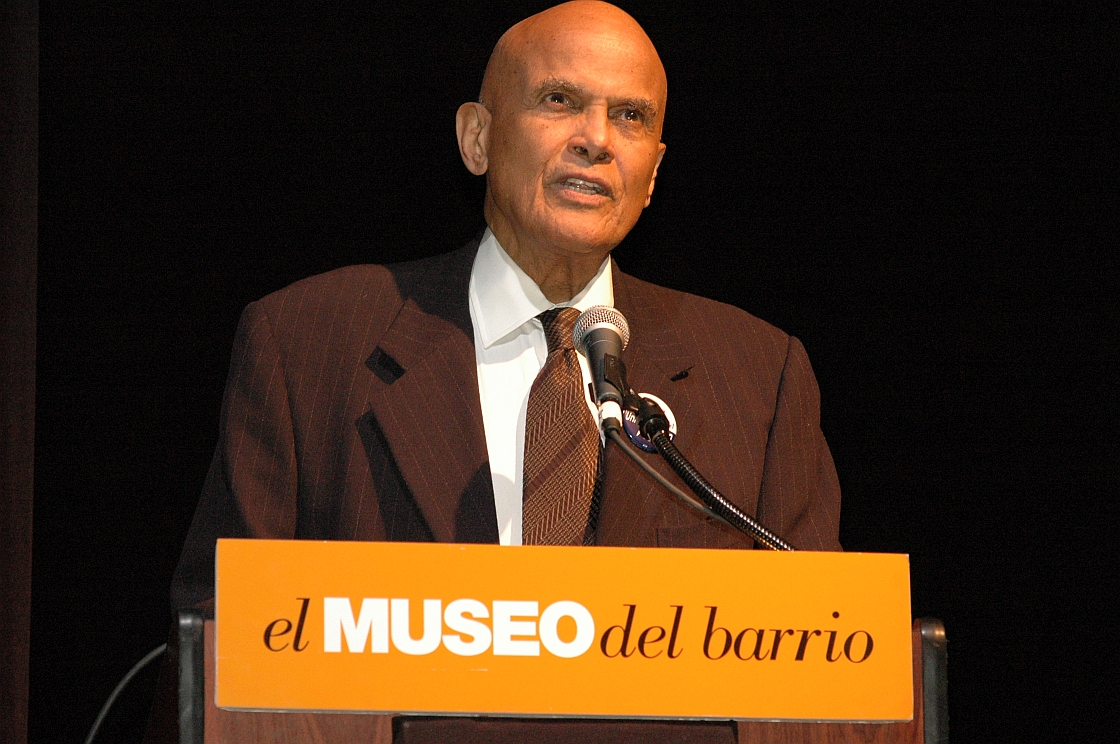Harry Belafonte (1927-2023)
Harry Belafonte, performer and political activist, was a longtime friend of ALBA and the Veterans of the Abraham Lincoln Brigade, as board members Jo Jurek and Dan Czitrom remember here.
I’ve heard many stirring speeches over the years at ALBA events, but none surpassed the electrifying address that Harry Belafonte gave at the 2007 reunion—which, as it happened, was also the first one to which my wife and I took our daughters. Belafonte had just turned 80. As we escorted him into the hall, I told him many of us saw him as the true heir to the activist legacy of Paul Robeson. Ever self-effacing, Belafonte brushed me off, insisting he could never compare to his mentor. Moments later, his own words proved him wrong. From the stage, he lauded the Lincolns for their heroism and the remarkable sacrifices they made, turning to themselves for solutions to the needs of the day. “It is your example,” he declared, “it is that which you have given us that has helped guide us through some of the darkest times in the history of this nation.” He also connected the Lincolns’ legacy to various ongoing struggles: for labor rights and civil rights, against colonialism, and for an end to the racist system of mass incarceration. “We defeated Hitler, but we did not defeat fascism,” he reminded us. “Fascism is not easily killed, not easily crushed. We still have work to do, we must be vigilant.” The Lincolns, he said, and now ALBA, still inspired young people all over the world to fight for social justice.
Belafonte closed by remembering a conversation he had with Paul Robeson in the singer’s difficult last days. He asked Robeson whether he felt that with everything he’d achieved, and with all the sacrifices and anguish he experienced, his journey had been worth it. Robeson replied that it’s not the victories we’ve gained or the losses we may have experienced, but the journey itself that makes the difference. “It is the men and the women and the courageous moments that are revealed to us,” Robeson told him, “that makes the journey towards freedom, towards human dignity, a battle and a journey worth taking—and I’m glad I was on it.”
The men and women who volunteered to fight in Spain inspired us with an untold number of “courageous moments.” So, too, did Harry Belafonte.
To see excerpts of Belafonte’s 2007 speech, as recorded by Democracy Now!, click here.
Daniel Czitrom is a Chair Emeritus of the ALBA Board.

Harry Belafonte and Julie Robinson with Steve Nelson at a VALB event in the 1970s. Courtesy of Jo Yurek.
Harry Belafonte was the keynote speaker at a Veterans of the Abraham Lincoln Brigade event in the mid-1970s. Before more than two thousand people gathered at the New York Statler Hilton, Mr. Belafonte gave a rousing speech describing the lack of progress the United States had made in addressing the inequalities that Black Americans faced despite the passage of the Civil Rights Act ten years earlier. The address was well received by an audience that had been fighting for civil rights long before it had become a prominent issue. After all, they’d gone to Spain as a totally integrated group and returned from Spain still fighting for those principles.
Harry Belafonte was joined by the President of the New York City Council, Paul O’Dwyer, councilwoman Miriam Friedlander, and union president Henry Foner. Although invitation stated that the event was to honor my father Steve Nelson, VALB commander, in reality we celebrated the fact that the VALB had been taken off the Attorney General’s list, that some of the Carabanchel prisoners had been freed, that the FBI was beginning to focus on other groups, that J. Edgar Hoover and Joe McCarthy were gone—and that people who for years had been afraid to be seen together could finally meet openly. The presence of a major star like Harry Belafonte and his wife, Julia Robinson, along with political people, was a clear signal to all those who had fought the good fight—their contribution to history was being recognized.
Jo Yurek is the daughter of Steve Nelson and ALBA Board member.
Remarks by Harry Belafonte about Paul Robeson to the Veterans of the Abraham Lincoln Brigade (1997)
Remarks by Harry Belafonte to the Veterans of the Lincoln Brigade/Abraham Lincoln Brigade Archives and friends celebrating the 60th anniversary of the Abraham Lincoln Brigade’s arrival in Spain. The event was held at Boro of Manhattan Community College, 199 Chambers St at West St, New York City, on Sunday, April 27, 1997, at 2:00pm. This is a transcription of an audio tape recording of the event. Harry Belafonte was introduced by Henry Foner, Master of Ceremonies and Retired President of the Fur and Leather Workers Union Joint Board.
Harry Belafonte: Thank you very much. Thank you. When I came in, and looked around, I saw groups of people related to this afternoon’s events, most of them looking somewhat older than myself … [laughter] … all smoking! I mean, I never saw so many cigarettes in my life! And I was thinking, you know […] when you’d have generations of future anti-fascists [??] set a better example! As a footnote I would like to tell you that I, selfishly, would like to see each and every one of you, live for another hundred years! [applause]
I’ve had occasion to say this before, and I’ll make it very brief, as I say it again. As a young boy growing up in the streets of Harlem in the United States, the idea that fascism should be everyone’s concern, and should be confronted vigorously, came to me very early on.
Central to that understanding was the heroism, and the bravery expressed, by the thousands of men and women all over the world who volunteered to be in the International Brigades to fight against fascism on the European continent.
They have been compared, on such excursions, as romantic adventurers. Certainly, to those of us who were profoundly affected by that contribution, there was no romance to it, although there was great adventure.
There was something almost __ more profound. It was a truth that engulfed the universe. It said that fascism anywhere is a threat to people everywhere. [applause]
And I, much to the consternation of many of my fellow servicemen, I, at the age of 17, volunteered to fight in the Second World War. I joined the United States Navy knowing fully well that what I was doing was only enhancing and carrying forth the mandate that had been given by those who had fought in Spain. (applause]. When I came out of the war .. I was mustered out of the service . . and thought that being an artist would be my calling . . . or the calling to be an artist was my thought . . [laughter].
It is interesting to me that I should have been blessed in those early years of decision-making by having been embraced by a man who had a profound effect on my life . . . Paul Robeson. [long applause] And it was from Paul that I learned [singing]: “Viva la Quince Brigada, Rumbala, rumbala, rum-ba-la.” And it was from Paul that I learned [singing]: “Los Quatros Generalos.”
And it was from Paul that I learned that the purpose of art is not just to show life as it is, but to show life as it should be. And that if art were put into the service of the human family, it could only enhance their betterment.
Paul said to me, he said, ‘Harry, get them to sing your song, and they will want to know who you are. And if they want to know who you are, you’ve gained the first step in bringing truth and bringing insight that might help people get through this rather difficult world.’
Shortly before he died, I visited him in Philadelphia. He was living at his sister’s. And I looked at this giant of a man who was, quiet frail in body, but still strong in spirit. And through all that had engulfed him — McCarthyism, the difficult times that he faced in this country because of his beliefs, because of his resistance to oppression — I looked at him, and I said, ‘Paul, I must know. Was all that you have gone through, really worth it? Considering the platform you had gained, and how easy life could have been for you, was it worth it?’ And he said, `Harry, make no mistake: there is no aspect of what I have done that wasn’t worth it. Although we may not have achieved all the victories we set for ourselves — may not have achieved all the victories and all the goals we set for ourselves, beyond the victory itself, infinitely more important, was the journey.’
To the men and the women [applause]…to the men and women whom I’ve met along the way, Paul made the difference. Paul’s strong center, his strength, and his power, and his gift, was the fact that he stood, in Spain, with the Lincoln Brigade, and sang in Madrid, at the height of the war in Spain.
That valor, and the valor of all the men and women who fought there, lives on. I’ve been to Rwanda. I’ve been to Zaire. I’ve been to South Africa. I’ve been to many places in the world. Wherever I see the resistance to tyranny, the resistance to oppression, I know that a banner is being carried forth, and will be waved high…the banner waved by the predecessors who fought in the International Brigade against fascism. There is nowhere in the world I go, where I see people resisting oppression, that I am not led to understand and believe, and know, that the standard was set for all of us by the Volunteers and what they did to bring to the world the bigger picture about where we were headed in the 20th Century.
I appreciate the invitation that was extended to me to be here, not just so much to make you feel good about yourselves, but to make me once again have the privilege of moving among you and feeling good to myself.
Thank you — and long live the Brigade and what it stands for — and long live each and every one of you — and give up smoking!
[Turning back to the audience as he exits to long applause]: Fidel Castro gave it up, you can give it up!













